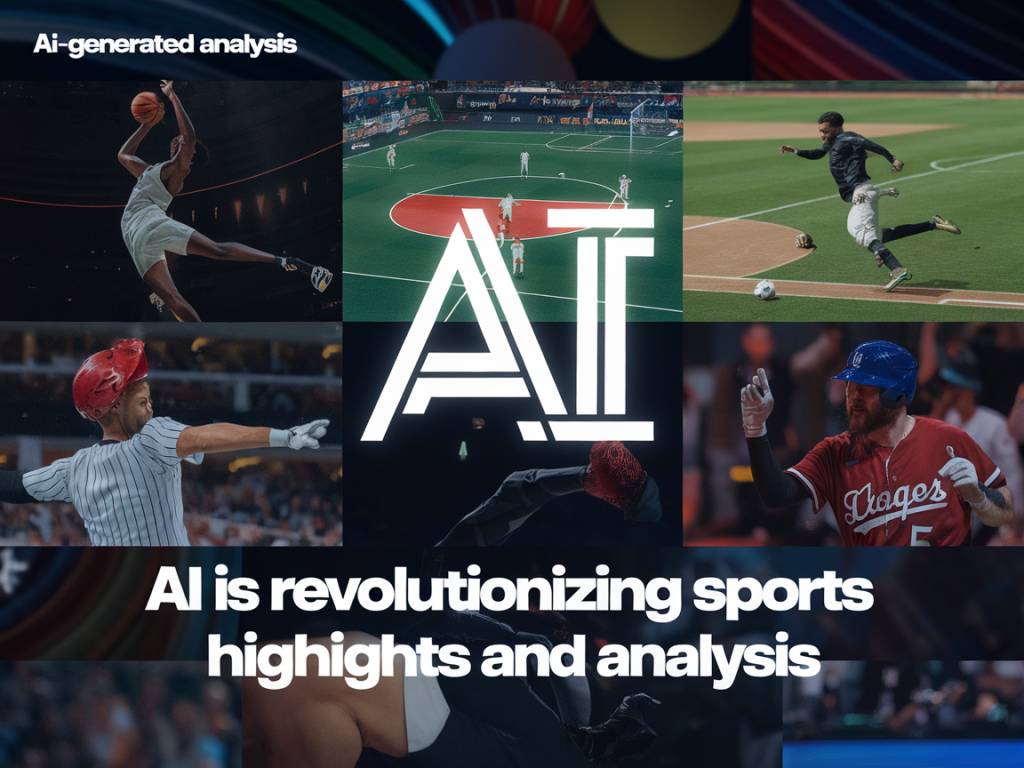Artificial intelligence (AI) is making a profound impact across various industries, and sports are no exception. From enhancing the way fans engage with their favorite sports to providing advanced tools for coaches and analysts, AI is revolutionizing sports highlights and analysis. This article explores how AI is transforming these aspects and what it means for the future of sports.
Enhancing Sports Highlights
One of the most visible impacts of AI in sports is the way highlights are generated and shared. Traditionally, creating sports highlights required a team of editors painstakingly reviewing game footage to select the most exciting moments. AI has significantly streamlined this process.
Advancements in machine learning algorithms enable AI systems to automatically identify key moments in a game. These algorithms analyze various factors such as crowd reactions, player movements, and game context to determine what constitutes a highlight. AI companies like WSC Sports and IBM Watson have developed proprietary technologies that can generate highlights in real-time, allowing broadcasters to share content almost instantaneously.
Moreover, AI-generated highlights are not just faster but also smarter. These systems can tailor highlights to individual preferences. For instance, a basketball fan might prefer to see more dunks and three-pointers, while a soccer enthusiast might want to focus on goals and near-misses. AI can cater to these specific needs, providing personalized content to enhance user experience.
Advanced Game Analysis
Beyond highlights, AI is also playing a crucial role in developing more sophisticated game analysis tools. Coaches and analysts have always relied on data to strategize and improve performance, but the advent of AI has taken data analytics to a new level.
One of the significant advantages of AI in sports analysis is its ability to process vast amounts of data quickly and accurately. Advanced algorithms can analyze player statistics, game footage, and even biometric data to offer deep insights that were previously unattainable. For instance, AI can track player movements and spatial configurations on the field to identify weaknesses in defense or optimal attacking strategies.
AI-driven analytics platforms like Second Spectrum and Catapult are providing real-time data visualizations that can be used during the game. This enables coaches to make instant tactical adjustments, giving them a competitive edge.
Player Performance and Injury Prevention
A key aspect of sports analysis is monitoring player performance and health. AI is making significant strides in this area as well. Wearable technology equipped with AI capabilities can track various health metrics such as heart rate, oxygen levels, and muscle strain.
These wearables feed data into AI systems that monitor for signs of fatigue or potential injury, enabling timely intervention. Such predictive analytics are invaluable in preventing injuries, prolonging careers, and optimizing player performance. Companies like Whoop and Zebra Technologies are at the forefront of developing such AI-driven wearable devices.
Fan Engagement and Experience
The rise of AI is not just beneficial for athletes and coaches but also for fans. AI is transforming how fans engage with sports, offering more interactive and personalized experiences.
Chatbots and virtual assistants, backed by AI, are providing instant information and interactive experiences. For instance, fans can ask these AI systems for updates, statistics, and predictions, significantly enriching their engagement. Moreover, AI-driven platforms like IBM Watson and ChatGPT offer detailed analysis and insights about the games, making the viewing experience more informative and enjoyable.
AI is also being used in creating augmented reality (AR) and virtual reality (VR) experiences, allowing fans to immerse themselves in the games like never before. These technologies offer a 360-degree view of the action, enabling fans to feel as if they are part of the game.
Scouting and Recruitment
AI is proving to be an invaluable tool for scouting and recruitment as well. Identifying new talent has always been a challenging and resource-intensive task. AI simplifies this by analyzing large datasets that include player performance metrics, game footage, and even social media activity.
Using machine learning algorithms, AI can predict the future performance of young athletes, giving scouts a data-driven approach to recruitment. For instance, companies like SciSports use AI to analyze player potential and scalability, making the scouting process more efficient and accurate.
Automated Content Generation
In addition to highlights and insights, AI is also automating the creation of written content. Through natural language processing (NLP) algorithms, AI can generate game summaries, player profiles, and even predictive articles. This enables sports news outlets to deliver timely content with minimal human intervention.
The integration of AI in content generation ensures that fans receive accurate and timely information. It also frees up human journalists to focus on more in-depth analysis and investigative reporting, enriching the overall quality of sports journalism.
Ethical Considerations and Challenges
While the advantages of AI in sports are apparent, it is also essential to consider the ethical implications. Issues such as data privacy, algorithmic bias, and the potential for technology over-reliance need to be addressed. Ensuring that AI systems are transparent, fair, and accountable is crucial for maintaining the integrity of sports.
Moreover, the rapid pace of AI development can sometimes outstrip regulatory frameworks, leading to gaps in oversight. It is imperative for the sports industry to collaborate with policymakers and technologists to create guidelines that ensure ethical AI deployment.
That said, the potential benefits of AI in revolutionizing sports highlights and analysis far outweigh the challenges. As AI technology continues to evolve, its impact on sports will only grow, offering new possibilities for fans, athletes, coaches, and analysts alike.
